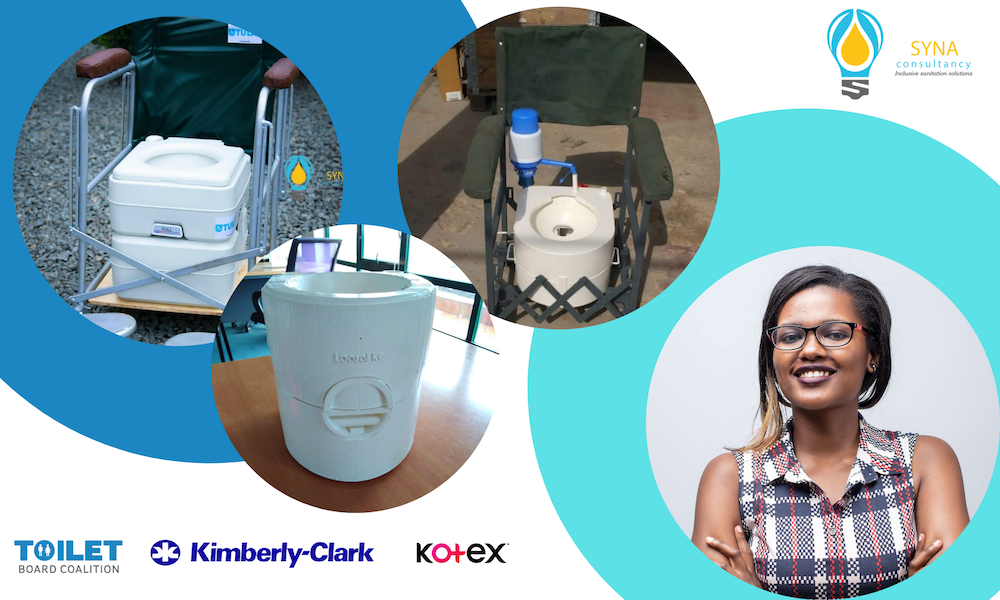
Sylvia Nyaga (left), founder of Syna Consultancy, training people on how to use the Utulav toilet in Kenya.
“My child has a reason to smile. We used cans before, but now we have a reason to smile.” This is one of many heartfelt testimonials for the Utulav toilet, created by Syna Consultancy in Kenya. The portable toilet meets the needs of people with mobility challenges in a safe, dignified and sustainable way.
The idea for Utulav was born after engineer and entrepreneur Sylvia Nyaga spoke with the parents of a child with a physical disability. Nyaga was already thinking of designing a toilet, but the conversation opened her eyes to how underserved the mobility challenged were and how much they needed a new solution. “I thought that was a more noble cause than whatever I was doing before,” she told us.
Three years and four prototypes later, Nyaga and her team now have a product ready for pre-order. The Utulav is portable, comfortable, and has an easy and sanitary disposal system. Manufacturing, however, proved a challenge. How could Nyaga’s team trust external manufacturers and hold them accountable? Today, Syna is manufacturing a key component of the Utulav in-house, and the team has a second, more affordable product in testing. Nyaga was even nominated this year for the Kenyan Zuri Awards, which recognizes outstanding women who are changing lives in Kenyan communities. Still, leaping from final product to market entry and expansion took a lot of work, and one aid that helped Nyaga overcome these hurdles was mentorship.

To mentors: Don’t start by giving advice
Over the past six months, five entrepreneurs in the sanitation space participated in a mentorship program created by Kimberly-Clark and its foundation, the company’s Kotex brand and the Toilet Board Coalition, a public-private partnership that brings businesses, investors and governments together to scale market-based solutions for sanitation issues. Through the Women in the Sanitation Economy Innovation Lab, the up-and-coming Kenyan entrepreneur was paired with multiple mentors from Kimberly-Clark, each with specialized expertise to help Syna, ranging from marketing to manufacturing and quality control.
In particular, Syna had a unique challenge: building product specifications that establish a common language with suppliers without the use of any lab equipment, said Inbar Bengio, a Kimberly-Clark senior quality manager based in Israel who served as one of Syna’s mentors. “What can you measure when you don’t have any lab equipment that would be relevant to the product performance?” Bengio asked rhetorically.
Bengio and Nyaga worked together to develop tests that were as simple as possible while still yielding valid results. For example, they used bags of cement as weights to test product durability. “It was a simple idea that I could not think of initially because, for me, I was thinking I need to go to a plant that has the big machines to test it,” Nyaga said.
As the relationship developed, Bengio realized she had a lot to learn from Nyaga. “I analyze big data … every minute of my day, and here we were with basically no data available, so how do you start from scratch?” Bengio explained. “One of the very important things Sylvia taught me was to listen. Don’t assume that you understand. Don’t start by giving advice…. she’s in the field. She sees people using the product, and she knows best.”
Syna used to fully outsource its manufacturing, but the team ultimately realized it could manufacture one key component locally while importing another. “It’s a little lower production cost because we source the materials ourselves, and because we’re the ones doing it, we’ll ensure we have a high-quality product, as opposed to having to deal with external manufacturers,” Nyaga said.
She attributes a lot of Syna’s forward movement to mentorship: “If it was not for the mentorship, we would not be as far as we are right now,” she told us. “If it was not for those conversations, I would not be having a second product.”
Mentorship pays off for mentees and mentors alike
The data is clear: Mentorship benefits mentors and mentees alike. In a 2018 survey from the American Express finch brand Kabbage, 92 percent of small business owners said mentorship had a direct influence on the growth and survival of their businesses, and 89 percent of those who didn’t have a mentor said they would want one.
Mentors benefit from these relationships, too. Bengio, for example, has been a mentor for quite some time — she even earned an external mentorship certificate — and she has seen her role as a mentor strengthen her work. “The biggest contribution or benefit that I gain from it is supporting my team and other people’s growth — seeing people getting stronger and more capable. I love watching them develop wings so they can fly,” she said.
The numbers back up Bengio’s experience of gaining by giving. One meta-analysis from the Journal of Vocational Behavior found that mentors are more satisfied with their jobs and more committed to their organizations than non-mentor counterparts. “The findings support mentoring theory in that mentoring is reciprocal and collaborative and not simply beneficial for protégés,” the report reads.
As such, mentorship tends to create ripple effects. Nyaga now plans to be a mentor to fledgling entrepreneurs herself. “It’s important to pass this down, because I also have people behind me,” she said. “That’s also something I would love to do -- mentor people who do not have the same experience as me.”
This article series is sponsored by Kimberly-Clark and produced by the TriplePundit editorial team.
Images courtesy of Syna Consultancy

Roya Sabri is a writer and graphic designer based in Illinois. She writes about the circular economy, advancements in CSR, the environment and equity. As a freelancer, she has worked on communications for nonprofits and multinational organizations. Find her on LinkedIn.














